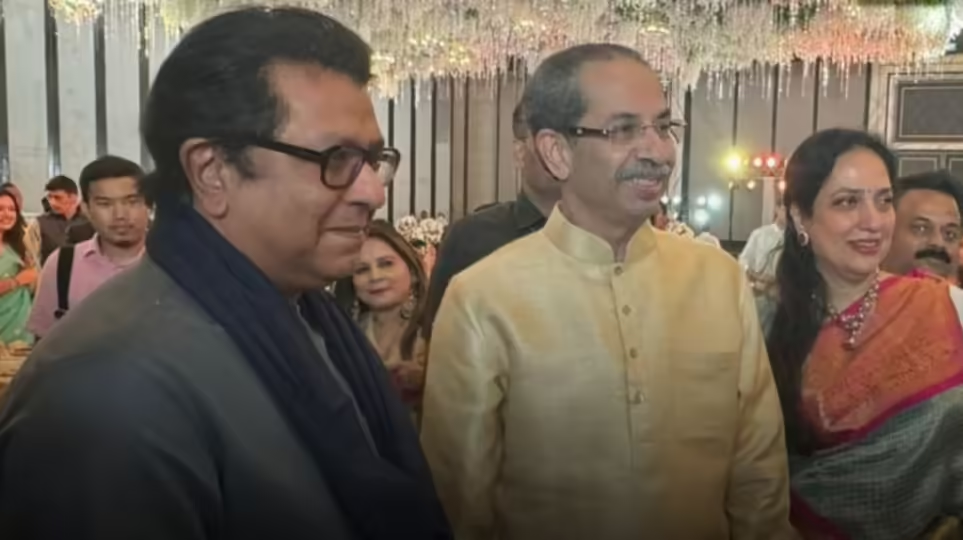Uddhav and Raj Thackeray's Renewed Interactions Hint at Possible Alliance Ahead of Civic Polls
Mon, 24 Feb 2025

Maharashtra's political landscape has been abuzz with discussions surrounding the relationship between cousins Uddhav Thackeray, leader of the Shiv Sena (UBT), and Raj Thackeray, chief of the Maharashtra Navnirman Sena (MNS). Their series of public interactions has ignited speculation about a potential reconciliation between the two leaders, especially in the context of the upcoming civic elections in the state. The most recent of these interactions occurred on February 23, 2025, during a wedding ceremony in Mumbai's Andheri area. Both Uddhav and Raj Thackeray attended the event, marking their third public meeting in as many months. Photographs from the occasion, widely circulated on social media, depict the cousins sharing light-hearted moments and engaging in friendly conversation. These images have further fueled discussions about a possible rapprochement between the two leaders. Prior to this, on December 15, 2024, Raj Thackeray attended the wedding reception of Shounak Patankar, the nephew of Uddhav's wife, Rashmi Thackeray, at Taj Land’s End in Bandra West. Although the cousins arrived at different times and did not meet during the event, Raj interacted warmly with Rashmi Thackeray and her family members. This gesture was seen by many as a sign of thawing relations between the two factions. A week later, on December 22, 2024, Uddhav and Raj Thackeray came face to face at the wedding of Raj's nephew, Yash Deshpande, in Dadar. The event provided an opportunity for the cousins to engage directly, further intensifying speculation about a potential political realignment. The history between Uddhav and Raj Thackeray has been marked by both familial ties and political divergence. Raj, once considered the political heir to their uncle, the late Bal Thackeray, parted ways with the Shiv Sena in 2005 due to internal disagreements. He subsequently founded the MNS in 2006, positioning it as a separate entity with its own political agenda. Over the years, the two cousins have often found themselves on opposing sides of Maharashtra's political spectrum. In the most recent Maharashtra assembly elections, the Shiv Sena (UBT) secured 20 seats, while the MNS did not manage to win any. This outcome has prompted political analysts to consider the potential benefits of a united front between the two factions, especially with the Brihanmumbai Municipal Corporation (BMC) elections on the horizon. A collaboration could consolidate the Marathi vote base and present a formidable challenge to other political contenders in the region. While these public interactions have sparked optimism among supporters about a possible alliance, official statements from both parties have remained non-committal. Political observers suggest that these meetings could be strategic, aiming to test public reaction and gauge the feasibility of a partnership. The dynamics of Maharashtra's politics are complex, and any potential alliance would require careful negotiation and alignment of political objectives. The upcoming civic polls add a layer of urgency to these developments. The BMC, being one of the richest municipal bodies in India, holds significant political importance. Control over the BMC not only offers administrative influence but also serves as a symbol of political dominance in Mumbai. A united front by the Thackeray cousins could reshape the electoral landscape, making the contest more competitive and compelling. In conclusion, the recent series of meetings between Uddhav and Raj Thackeray has reignited discussions about a potential political reunion. While the public displays of camaraderie suggest a softening of past differences, the true implications of these interactions will unfold in the coming months. As Maharashtra approaches its civic elections, the possibility of a Thackeray alliance remains a focal point of political discourse, with the potential to significantly impact the state's political trajectory.
